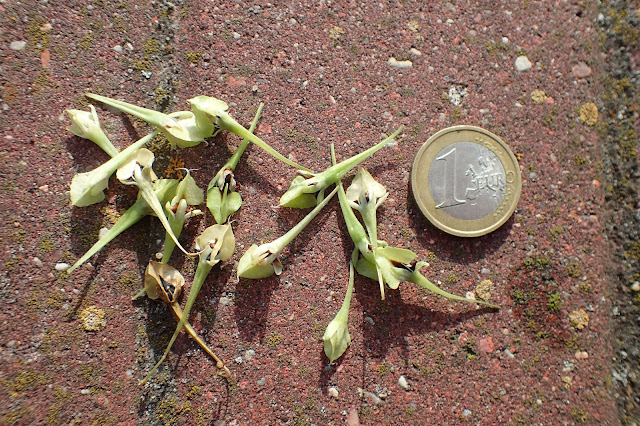This
is a Chinese cousin of common buckwheat (Fagopurum esculentum) called
also by other name - Pteroxygonum giraldii. Chinese name is: hong
yao zi. This large (often more than
3 m = 10 ft tall, dense climber creates underground perennial
tuberous
rhizome to 15cm (= 6 inch)
diameter. It is very frost hardy - it grows in central China at
altitude 600-2000m (= 2000-6666 ft). In summer (July-September at my
latitude 50°N)
it creates small white flowers in
long-stalk inflorescences and
later in October mature small winged nutlets with 3 prickles at base,
which fall down when they are ripe. The leaves are triangular-hastate
with purple mark when young – they
are very oramental. This
plant very resembles a Caucasian spinach (Hablitzia tamnoides) in
appearance, but this is not edible, but only medicinal. It blooms and
fruits in first year from seeds, if sown early. The best sow the
seeds surface in early to mid
spring in pots inside and replant carefully (do not damage the roots)
after last frosts. The seeds
germinate easily and fast without any pre-treatment. I
am not sure if it is frost hardy in my zone 6b, but it should be. I
am going to check it this winter.
The first young inflorescences in late July (in first year growing from seeds)
The young fruits and flowers (it was in flowers to September)
The flowers were pollinated mainly by wasps
It can be quite large plant (to about 3-4 m = 10-13 ft tall)
 |
| Ripe fruits fall down |
 |
| The ripe, winged and horny, nutlets about 1 cm = 0,4 ich long (the coin on the photo is size about 2,5cm = 1 inch) |
 |
| Young seedlings |
 |
| It is very strange plant. The first shoot do not grow up from between cotyledons (as in case other dicotyledonous plants) but from the base near cotyledons |


















No comments:
Post a Comment